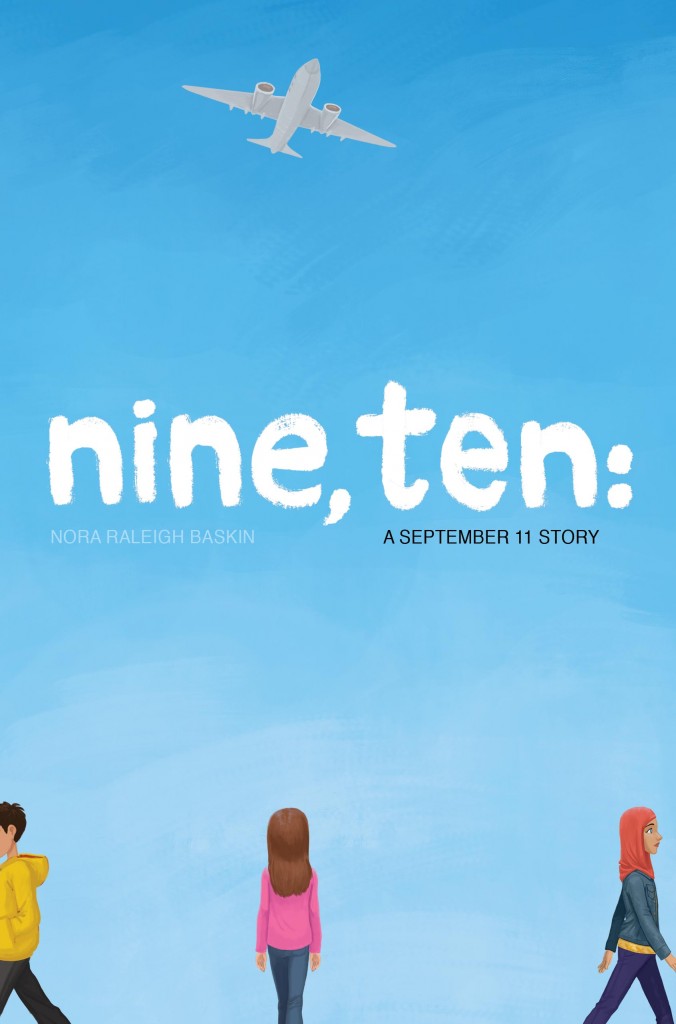Nine, Ten: A September 11 Story
Written by Nora Raleigh Baskin
Simon and Schuster, 2016, 197 pp.
ISBN-13: 978-1-4424-8506-8
People would remember that day with all sorts of adjectives: serene, lovely, cheerful, invigorating, peaceful, quiet, astounding, crystalline, blue. Perfect. Until 8:46 a.m., when the first plane struck the North Tower of the World Trade Center and nothing would ever be the same again. (p. 2)
Sergio lives in Brooklyn with his grandmother, resenting the fact that his father is never around. Naheed, from Ohio, is of Middle Eastern descent and has difficulty explaining her cultural tradition of wearing the hajib at her new school. Aimee has recently moved with her family to Los Angeles and struggles to find her niche within the California youth culture. Will has recently lost his father in a highway accident, and his family still mourns as Will tries to fill the void with his friends in Shanksville, PA. Nine, Ten: A September 11 Story opens on September 9 by introducing readers to these four very different and geographically separated young people whose lives become intertwined on September 11 – as did the lives of people across the globe that day. Their stories are told alternatively within the book in the days leading up to September 11. While none of them lose close family or friends during this catastrophic event, each family is impacted in a way that finds them at the 9-11 Memorial event in 2002 where their lives actually cross physically as the names of the 9-11 victims are read.
While the context of this book is within the US, its place within international literature is significant as young readers who were not alive on September 11, 2001 are situated within the lives of ordinary people impacted by the attack on the World Trade Center, Pentagon, and Pennsylvania countryside. Baskin states in an author’s note, “I chose the structure of this story to reflect a theme of interconnectivity in our society, in particular between children” (p. 194). The intersection of their lives in intangible ways can be considered as representative of the intersection of lives across the global community following this event–an event that brought about new words, new legal restrictions, new conflicts, and new perceptions regarding certain ethnic groups living both inside the US and in other countries. Terrorism and conflict are often perceived to be outside the boundaries of the US, but books such as this force readers to face the reality that tragic events impacting the global society can occur within any society and the people immediately impacted can be mirrored in any population.
Nora Raleigh Baskin is an award-winning author whose book Anything But Typical (2009) won the American Library Association Schneider Family Book Award. On her website, www.NoraBaskin.com, she shares that all her writing involves her life experiences. In the author’s note for Nine, Ten: A September 11 Story, she describes her own location in Wilton, Connecticut on that day and her reaction during the 9/11 event. Her acknowledgements point to her research and that of others to assure accuracy in the timeline of events, the use of Muslim phrases and ideas, and in seeking individuals who witnessed the crash site of the plane in Shanksville, PA. The stories of the four young people in this book are fictional but universal as they speak to the family challenges that many young teens face even today.
A 9/11 text set could build a context for this historic tragedy and might include: Towers Falling (Jewell Parker Rhodes, 2016), America Is Under Attack (Don Brown, 2014), Eleven (Tom Rogers, 2014), and September 11 Then and Now (Peter Benoit, 2011), among others.
Janelle Mathis, University of North Texas, Denton, TX
WOW Review, Volume IX, Issue 3 by Worlds of Words is licensed under a Creative Commons Attribution-NonCommercial-ShareAlike 4.0 International License. Based on work at https://wowlit.org/on-line-publications/review/ix-3/

